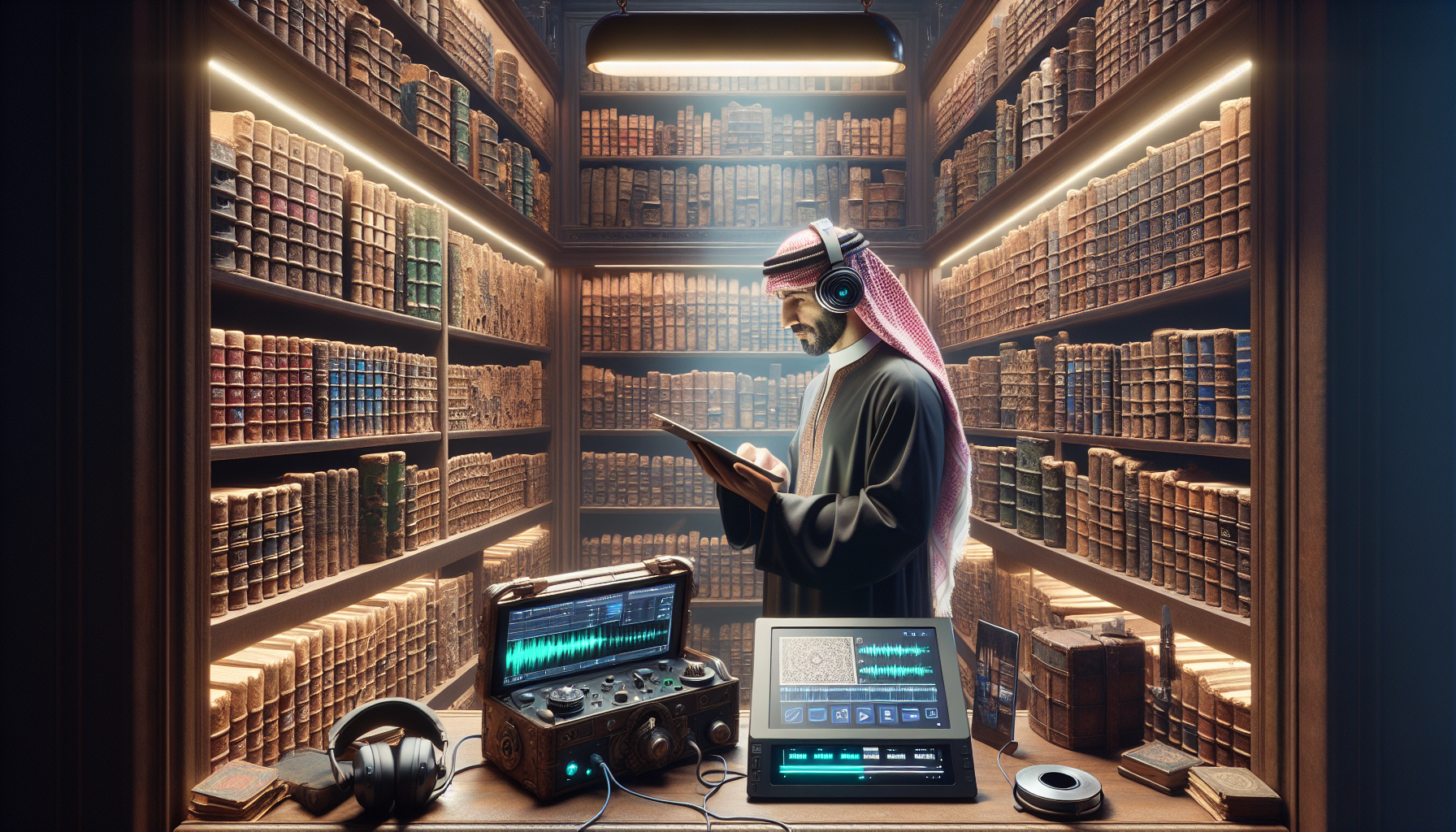In a world that constantly races towards the future, where technology and innovation are often at the forefront of our daily lives, it’s easy to overlook the rich tapestry of the past that has shaped the present. Yet, for those willing to pause and listen, the past offers invaluable lessons and narratives that can deepen our understanding of the human experience. One of the most compelling ways to connect with history is through audio archives—repositories of voices and sounds that transport us to bygone eras. These archives, once accessible only to scholars and historians, are now increasingly available to anyone with an internet connection, unlocking a treasure trove of historical insights. 📜🔊
Imagine listening to the crackling radio broadcasts that announced the end of World War II, the impassioned speeches of civil rights leaders, or the hauntingly poignant interviews with everyday people from decades past. Audio archives have the unique power to convey the emotion and immediacy of historical events in a way that written records cannot. As we explore the world of accessible audio archives, we’ll discover how these recordings offer a more intimate and nuanced understanding of history, allowing us to hear the past in its own voice. This journey not only enriches our knowledge but also fosters a deeper connection to the stories that have shaped our collective identity.
In this article, we’ll delve into the diverse landscape of audio archives, examining their significance and the transformative role they play in historical research. We will highlight notable collections from around the world, showcasing the vast array of topics they cover—from pivotal political moments to cultural phenomena and personal anecdotes. We’ll also discuss the technological advancements that have made these archives more accessible than ever before, empowering educators, students, and history enthusiasts to explore the past with unprecedented ease. Moreover, we’ll consider the challenges of preserving these audio treasures and the ongoing efforts to ensure they remain available for future generations.
Join us as we embark on this auditory exploration of history, where each recording is a window into a different time and place. By the end of this journey, you’ll not only have a greater appreciation for the depth and diversity of audio archives but also a renewed sense of curiosity about the stories that lie waiting to be discovered within them. Whether you’re a seasoned historian, an educator looking to inspire your students, or simply a curious soul eager to learn, these accessible audio archives hold the key to unlocking the past in a profoundly engaging way. Let’s dive into this rich auditory world and uncover the echoes of history that continue to resonate in our lives today. 🌍🎧
The Evolution of Audio Archives
The journey of audio archives is a fascinating one, tracing the technological advances that have brought us from wax cylinders to digital repositories. Understanding this evolution is crucial for appreciating the rich tapestry of audio history available today. It all started in the late 19th century when Thomas Edison introduced the phonograph, a device that recorded sound on tinfoil cylinders. This innovation marked the first time sound could be captured and replayed, setting the stage for future developments.
As technology progressed, so did the methods of recording and preserving audio. The transition from cylinders to discs was a significant milestone, offering better sound quality and longer recording times. By the mid-20th century, magnetic tape became the standard, revolutionizing the way audio was recorded and archived. This technology allowed for more extended recordings and easier editing, which greatly benefited archivists and historians. The digital revolution of the late 20th century further transformed audio archiving. With the advent of the internet and digital storage, audio archives have become more accessible than ever. Digitization projects have made it possible to preserve and share recordings with a global audience, opening up new opportunities for research and education.
Today, audio archives are invaluable resources for historians, educators, and enthusiasts. They offer a unique window into the past, capturing voices and sounds that text alone cannot convey. Whether it’s listening to a famous speech, a historical interview, or traditional music, audio archives provide a richer understanding of history. As we explore these archives, it’s essential to consider the ethical implications of access and usage, ensuring that we respect the rights and wishes of those whose voices are preserved.
The Importance of Audio Archives in Historical Research
Audio archives play a critical role in historical research, providing insights that are often absent from written records. These archives capture the nuances of speech, emotion, and context, offering a more immersive experience of historical events. They allow researchers to hear the voices of those who lived through significant moments, providing a personal connection to the past. For historians, audio archives are a treasure trove of primary sources, offering firsthand accounts and perspectives that enrich our understanding of history.
One of the key benefits of audio archives is their ability to preserve oral histories. These are accounts of events and experiences passed down through generations, often shared verbally rather than written. Oral histories provide a unique perspective, capturing the voices of individuals who may not have had the opportunity to contribute to written records. Audio archives ensure that these voices are preserved for future generations, allowing us to explore diverse narratives and perspectives.
In addition to oral histories, audio archives include a wide range of materials such as speeches, interviews, music, and radio broadcasts. These recordings offer valuable context and depth, shedding light on cultural, social, and political aspects of the past. For instance, listening to a speech delivered by a historical figure can provide insights into their personality and rhetorical style, enhancing our understanding of their impact and legacy. Audio archives are also instrumental in preserving musical traditions, capturing performances and compositions that might otherwise be lost to time.
Exploring Accessible Audio Archives
The accessibility of audio archives has dramatically increased with digital technology. Many institutions have undertaken massive digitization projects, making their collections available online. This has democratized access, allowing anyone with an internet connection to explore these resources. However, navigating these vast archives can be daunting. It’s essential to know where to look and how to utilize these resources effectively.
Several platforms and institutions offer extensive audio archives. The Library of Congress, for example, hosts a vast collection of recordings, ranging from early sound recordings to contemporary interviews. Their digital collections are easily accessible and offer a wealth of information for researchers and enthusiasts alike. Similarly, the British Library has a comprehensive sound archive, featuring recordings from around the world. These institutions provide valuable search tools and guides to help users navigate their collections.
For those interested in exploring accessible audio archives, here are some steps to get started:
- Identify your research focus or area of interest.
- Search for relevant institutions or platforms with audio archives.
- Utilize search tools and filters to narrow down your results.
- Listen to recordings, taking notes on key insights and observations.
- Consider the ethical implications of using and sharing these materials.
Comparing Popular Audio Archives
To assist you in navigating the world of audio archives, here’s a comparative table of some popular platforms:
| Platform | Focus | Access | Notable Features |
|---|---|---|---|
| Library of Congress | Diverse historical recordings | Open access | Extensive search tools, rich metadata |
| British Library | Global sound recordings | Open access | International collections, detailed guides |
| Internet Archive | Wide range of media | Open access | Massive digital library, community contributions |
| Smithsonian Folkways | Traditional music and culture | Subscription-based | Focus on cultural preservation, curated playlists |
Enhancing Learning with Audio Archives
Audio archives are not just valuable for historians; they are also powerful tools for education and lifelong learning. These resources can enhance classroom learning by bringing history to life, allowing students to engage with the past in a dynamic and interactive way. Teachers can incorporate audio recordings into their lessons, providing students with firsthand accounts and diverse perspectives on historical events.
For educators, audio archives offer a wealth of material to enrich their curriculum. They can use these recordings to illustrate key concepts, provide context for historical events, and foster critical thinking skills. For example, students can listen to speeches from different eras to compare rhetorical styles and analyze how public speaking has evolved. Music recordings can be used to explore cultural and social movements, examining how they influenced and were influenced by historical events.
Beyond the classroom, audio archives are excellent resources for lifelong learners and enthusiasts. They provide opportunities to delve deeper into topics of interest, exploring the rich history and culture captured in these recordings. Podcasts and online courses often incorporate audio archives, offering engaging ways to learn and explore. Whether you’re a student, teacher, or curious individual, audio archives are an invaluable tool for expanding your knowledge and understanding of the world.
Watch This
For a more in-depth exploration of audio archives and their impact on historical research, watch the video “The Power of Sound: Exploring Audio Archives” on the History Channel. [Watch here] 🎧

Conclusion
Certainly! Here’s a comprehensive conclusion for your article on “Unlocking the Past: Exploring Accessible Audio Archives for a Richer Understanding of History”:
—
In conclusion, exploring accessible audio archives offers us a profound opportunity to enrich our understanding of history, providing a dynamic and engaging medium through which we can connect with the past. This article has delved into the significance of audio archives, underscoring their role in preserving oral histories, capturing cultural nuances, and offering a more inclusive historical narrative.
We began by highlighting the unique strengths of audio archives, such as their ability to convey emotions and intonations that written records often miss. By presenting firsthand accounts and testimonials, these archives allow us to experience history in a way that is both personal and immersive. This sensory engagement is crucial for a deeper comprehension of historical events and their impacts on individuals and societies.
Moreover, audio archives democratize access to historical knowledge. They break down barriers for individuals with visual impairments or those who struggle with traditional text-based resources, fostering a more inclusive approach to learning. The advent of digital technology has further amplified this accessibility, making it easier than ever to explore a wealth of audio materials from around the globe.
Throughout our discussion, we also examined the technological advancements that have facilitated the digitization and dissemination of audio archives. These innovations have transformed the way historians, educators, and the general public interact with historical data, enabling the preservation of fragile recordings and ensuring their availability for future generations.
Importantly, we acknowledged the challenges associated with maintaining and curating these vast repositories. Issues such as metadata accuracy, copyright restrictions, and the need for sustainable funding are critical considerations in the ongoing management of audio archives. Addressing these challenges is essential to maximize their potential as educational and cultural resources.
As we look to the future, the potential of audio archives to inspire and educate remains immense. They offer a treasure trove of stories waiting to be discovered, analyzed, and shared. By fostering a richer, more nuanced understanding of history, audio archives encourage us to think critically about the past and its influence on our present and future.
In light of these insights, we encourage you to explore these fascinating resources further. Consider how audio archives can complement traditional historical narratives and enhance your own understanding of the past. Whether you are a student, educator, researcher, or simply a history enthusiast, there is much to be gained from engaging with these auditory treasures.
We invite you to share your experiences and insights in the comments section below. How have audio archives enriched your understanding of history? What unique stories have you uncovered through this medium? Your input can help foster a vibrant discussion and inspire others to delve into the world of audio archives.
Furthermore, sharing this article with friends and colleagues can spark curiosity and encourage more people to explore the potential of audio archives. Together, we can promote a broader appreciation for this invaluable historical resource and ensure that the voices of the past continue to resonate in our present and future.
In closing, the exploration of accessible audio archives is not just an academic exercise; it is a journey into the human experience across time. By unlocking the past through these archives, we open the door to a richer, more inclusive understanding of history, one that celebrates diversity, empathy, and shared humanity. Let us embrace this opportunity to learn, connect, and grow. 🌍📜🔊
For more on the subject, explore these active resources:
– [Library of Congress: Audio Collections](https://www.loc.gov/audio/)
– [British Library Sounds](https://sounds.bl.uk/)
—
This conclusion aims to encapsulate the essence of your article while encouraging reader interaction and further exploration of the topic.
Toni Santos is a sensory storyteller and soundscape artisan whose work explores the forgotten language of the Earth through acoustic ecology storytelling. With a deep reverence for the natural world’s sonic textures, Toni crafts narratives that awaken our ears to the subtle music of forests, winds, waters, and wild silence.
His creative journey is rooted in a desire to preserve and interpret the acoustic heritage of environments, both ancient and fragile. From the echo of birdsong in a disappearing jungle to the resonance of stones in sacred landscapes, Toni’s stories reflect the memory held in sound—often overlooked, yet deeply felt.
With a background in environmental aesthetics and sonic design, Toni blends field recordings, visual symbolism, and poetic insight to create immersive experiences that honor the sonic soul of nature. His work does more than document; it invites listeners to re-tune themselves to the rhythms of life that still pulse beneath modern noise.
As the voice behind Vizovex, Toni shares sound-based studies, ambient narratives, and reflective content that help others reconnect with how sound shapes memory, meaning, and place.
His work is a tribute to:
The lost soundscapes of vanishing ecosystems
The role of natural acoustics in cultural and emotional memory
The healing potential of listening deeply to the world
Whether you’re an artist, an ecologist, or someone drawn to the quiet power of listening, Toni invites you into a space where every rustle, ripple, and resonance becomes a story—one note, one place, one heartbeat at a time.




